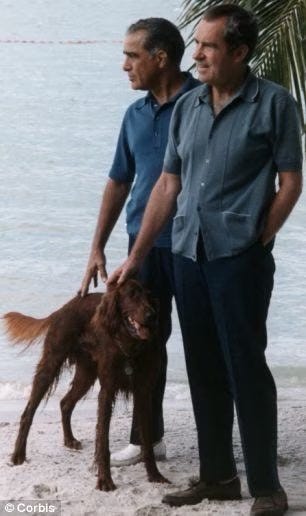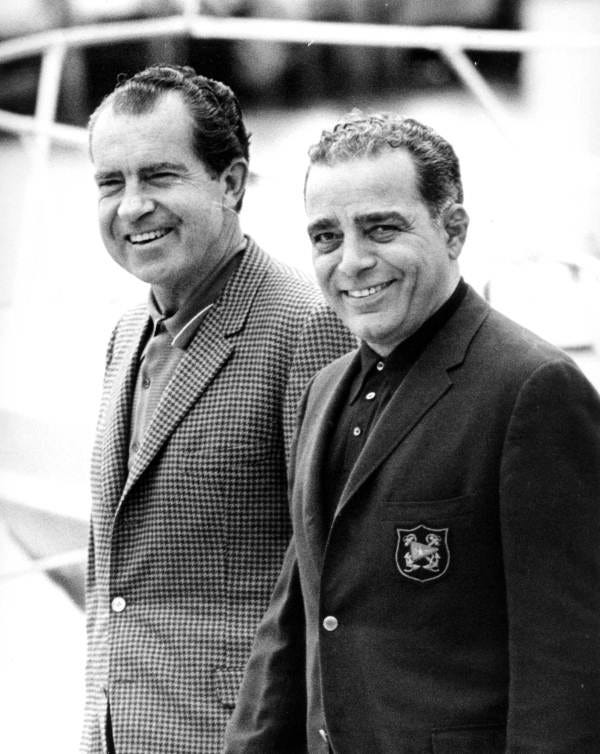How Recruitment Works: Some Examples Historical and Personal
Or, why I am not a Holocaust denier or much of a joiner at all
I want to talk to you about how people get approached and recruited but I’m not sure exactly how to do it without revealing too much. I suppose I should start with a little history.
You understand a lot about the presidency’s relationship to organized crime if you understand these photos of President Nixon with Charles “Bebe” Rebozo. The two men vacationed together, dressed alike, and enjoyed listening to Broadway show tunes together. It helps if your bag man has his own secrets and you can leverage that in a form of mutual compromise.
I’ve heard it argued that Nixon agreed to resign in large measure if he and Rebozo went unmolested, especially as regards the Howard Hughes money which was then considered for a legal defense.
And indeed they were left largely alone. When a New York Times biographer wrote a book about Bebe, vandals broke into the house and stole the unpublished manuscript. No one was ever caught.
You should understand the Italian mafia, working with CIA, wanted to recompromise Nixon, who was a closeted homosexual and an open autodidact. Both groups are considered dangerous.
Did you know that Nixon once thought that people were born gay?
If Nixon is right — that people were born gay — it stands to reason that we’ve had a lot more closeted politicians and indeed it makes you wonder about Nixon himself, as many a biographer has probed.
Being gay is one thing, of course, but the larger question is whether or not Nixon’s alleged homosexuality might portend other things in his proverbial closet. The forays into the archives are worthwhile because they reveal a hidden history to American life.
Mark Aarons and John Loftus are explicit about it, writing:
Richard Nixon’s political career began in 1945, when as a navy officer he was assigned to review some captured Nazi documents. Allen Dulles told Nixon to keep quiet about what he had seen and, in return, arranged to finance the young man’s first congressional campaign.
…
The Dulles brothers took Nixon under their wing and escorted him on a tour of fascist, “freedom fighter” operations in Germany.
When Truman was reelected in 1948, Nixon became Allen Dulles’ mouthpiece in Congress. Both Nixon and Senator Joseph McCarthy received volumes of classified information to support the charge that the Truman administration was filled with “pinkos.” When McCarthy went too far in his Communist investigations, it was Nixon who worked with CIA director Bedell Smith, to steer investigations away from the intelligence community.
The CIA was grateful for Nixon’s assistance. Dulles had been recruiting Nazis under the cover of the State Department’s Office of Policy Coordination, whose chief, Frank Wisner, had systematically recruited the Eastern European émigré networks that had worked for the Nazi SS. [Editor’s Note: Since WWII, these Nazi émigrés have been instrumental in many U.S. government covert operations including drug and weapons smuggling, Latin American death squads and protofascist regimes, LSD mind control experiments (like MKULTRA), the Republican National Committee’s Ethnic Heritage Councils as well as the presidential campaigns of Richard Nixon, Ronald Reagan and George H.W. Bush.]
…
In 1953, when the Republicans were in office, the immigration laws were changed to admit Nazis, even members of the SS. They flooded into the U.S. Nixon oversaw the new im- migration program. As vice president, he received Eastern European fascists in the White House. After a long, long journey, these Nazis had found a new home in the U.S., where they reestablished their networks.
In other words Nixon was elected to the U.S. House in 1946 —a role secured only after he had entered into a lifelong alliance with Allen Dulles, the famously pro-NAZI OSS spymaster.
It was Nixon who served Dulles’s interests in the U.S. House and Nixon built a national name for himself during the Alger Hiss spy scandal.
The gay subplot with McCarthy and Nixon and Alger Hiss was memorably recounted in Jamie Kirchick’s otherwise forgettable gay history of DC.
Less discussed was Nixon as an avatar of pro-Nazi CIA interests and Senator McCarthy, a closeness to the Russian-Jewish world through Roy Cohn.
Still, the experience established him as the leading anti-communist and soon Nixon found himself as the Vice President notwithstanding the so-called Fund scandal. (The Fund scandal showed the ways in which dark money could be used and moved.)
What Nixon pioneered McCarthy sought to copy and use to make himself a national figure. It was all a bit of play acting.
The writer and social critic Gore Vidal — himself gay — believed Joseph McCarthy to be gay, telling an interviewer:
Raskin: Did “fag-baiting” and “red-baiting” go hand in hand when your writing career began?
Vidal: Not at the very beginning, though Senator Joseph McCarthy brought them together, being a homosexual himself. That was the Dostoevskian twist to the whole thing. McCarthy was like a character out of The Brothers Karamazov—a homosexual who used homosexuality as his most terrible weapon against his enemies, both real and imagined. McCarthy and his aide, Roy Cohen, were constantly sniggering about fags and they themselves were fags. That was an ugly bit of business, but then after the televised Army-McCarthy hearings McCarthy fell like Lucifer.
McCarthy’s handler — then 26-year-old Roy Cohn — most assuredly was gay, having died later of HIV/AIDS.
Nixon worried about hunting communists because he didn’t necessarily want everyone knowing how close he was to the Nazis.
He quickly saw how dangerous a red hunt could be for people such as himself who were linked to still other politically damaging ideologies.
You see Nixon was close to the Germans and with the German archives ultimately falling into Soviet control, he ended up getting controlled by the Russians. Remember it was the Red Army which took Berlin and got its archives first.
Worse yet, many of the Nazis who were brought to the United States were themselves loyal to the Soviet Union. We’ve already talked about die Hacke, haven’t we?
You’re not allowed to talk about those SS officers or Nazis who lived out their days in America and the role they may still play in everyday life.
For what it’s worth I’ve come to believe that their children run much of Silicon Valley today.
What do you think the Thiel fellowship really is?
******
There quite a number of topics where you won’t ever be permitted to know what really happened. The question is whether or not you really want to know or if you’ll just be content to suck in whatever the story is. The socially optimal thing to do when these topics are brought up is to change the subject.
But my suspicion is that if you’re here you are wondering about how things actually work.
In my experience there are two sorts of people who make their forays into the past:
1.) There are those who, upset about how the world around them is, look for knowledge like ammunition which can help them get ahead.
2.) There are those, who, curious as to how things really work, find ourselves out in the world exploring.
You can think of the first group as the revolutionaries, the troublemakers. You might think of all this talk of disruption as being a part of that.
After all, the right insight, the right technology, can overthrow the existing order—almost always for the worst. Perhaps the reason that the tech companies and their attendant ops seem so dangerous is that they are interested in using knowledge to overthrow the world.
The world is not kind to explorers and there are many attempts to kill them. I should know. I am an explorer and I have dodged my share of wild animals as I have cut a trail.
Worse yet, if you trod in sacred pastures you might get gored by bulls who see any incursion as a provocation.
Indeed one of the reasons I tell young people not to dabble in Holocaust denial circles is that you’ll find that you summon Nazis and their descendants who will be only too glad to make you their play thing.
A woman I had known for a great many years was the daughter of a SS officer. She had grown up in the Cleveland suburbs. She was, in other words, trying to recruit me.
When she discovered that I was not a Nazi she came to ruin me—and accused me of being a Nazi.
****
Some years ago, when I was in middle school, I was identified by a woman I later learned was if not British intelligence then closely associated. She was charming and Jewish-ish. She hated Netanyahu and had family in Israel. It is not an understatement to say that I loved her.
She bought me a bicycle and a computer but my favorite gift was a collection of Sherlock Holmes stories. She took me on my first trip to Europe where her son and I devoured science fiction books while running around castles and tracking down whatever English-language books we could find.
Her partner was a German scientist who had all the humanitarian anti-Americanism we’d come to expect from the Germans. They saw the Eurozone as a harbinger of the end of an American dominated world.
The scientist’s father had been a U-Boat captain and as I ran around the property playing badminton I wondered how many people his father had dispatched to the bottom of the sea.
This relationship, like so many others, taught me that things are a bit more complicated than the fairytale version of World War II.
****
Some years ago I had a mentally ill woman who worked for me. She suffered from alcoholism and self-doubt which together proved to be her undoing.
I paid her a number of kindnesses — I backed her when she libeled someone — and she punished me by lying about me to anyone and everyone who would give her the time of day.
She had invited me to see the late David Irving who it just so happened was in America. Irving is a Holocaust revisionist writer and I had read some of his essays and a few of his books which had been gifted to me over the years. (I collect controversial books.)
My sense was that this invitation was something of a trap and I kept my distance. I was correct. No sooner had I decided against attending did I discover that my former employee had made public my emails to the Zionist outlet The Atlantic, which attacked me for my polite refusal to attend!
Looking back on it now, Irving was almost assuredly British intelligence. If you found his stuff interesting you were marked with a sort of ink you could never wash off.
I learned a few years later that I had passed the test.
The trick is to evince a skepticism but not an idolatry and certainly never a zealotry.
The world is filled with questions you’re not allowed to ask. Learning how to ask them or interrogate without being harmed is the source of great power.
I’ll let you know when I figure out how to do it. Then again, maybe I won’t.




Unz.com comes to mind as a honeypot based on your article regarding Holocaust denialism.